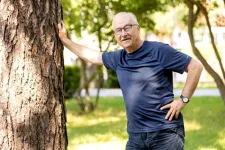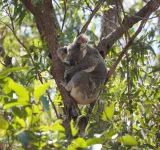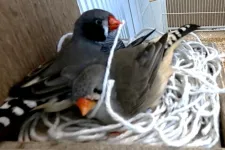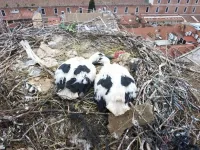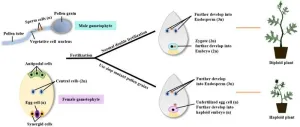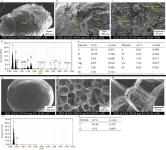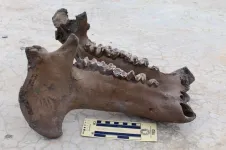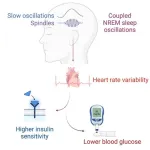(Press-News.org) Indigenous Peoples in Canada have higher illness rates and lower life expectancies than non-Indigenous Canadians. A new study reveals that Indigenous men in the country who have prostate cancer are being diagnosed with more advanced and more aggressive tumors than their non-Indigenous counterparts. The findings are published by Wiley online in CANCER, a peer-reviewed journal of the American Cancer Society.
To identify disparities in prostate cancer screening, diagnoses, management, and outcomes between Indigenous and non-Indigenous men in Canada, a team led by Adam Kinnaird, MD, PhD, of the University of Alberta, examined data on 1,444,974 men who were screened for prostate cancer in 2014–2022 and were enrolled in the Alberta Prostate Cancer Research Initiative.
When they examined testing rates by postal code, the investigators found that men in Indigenous communities were less likely to have prostate-specific antigen (PSA) tests to detect prostate cancer than men outside of Indigenous communities (32 versus 46 PSA tests per 100 men aged 50–70 years within 1 year).
Also, among 6,049 men diagnosed with prostate cancer, Indigenous men were more likely to have PSA levels ≥10 ng/mL (48% versus 30%), stage II or higher cancer (65% versus 47%), and high-grade tumors (79% versus 64%) than non-Indigenous men. In addition, over a median follow-up of 3.3 years, Indigenous patients were 2.3-times more likely to experience cancer spread, or metastasis, than non-Indigenous patients.
“What is critical about this is that these results come from within a publicly funded universal health care system in which all peoples should have equal access to care,” said Dr. Kinnaird. “The findings are significant because they identify Indigenous men as a population at risk for more aggressive prostate cancer and potentially worse survival. Key infrastructure changes, including better access to primary care physicians, may help improve prostate cancer screening and identify men at earlier, and curable, stages of the disease.”
Additional information
NOTE: The information contained in this release is protected by copyright. Please include journal attribution in all coverage. A free abstract of this article will be available via the CANCER Newsroom upon online publication. For more information or to obtain a PDF of any study, please contact: Sara Henning-Stout, newsroom@wiley.com
Full Citation:
“Disparities in prostate cancer screening, diagnoses, management, and outcomes between Indigenous and non-Indigenous men in a universal healthcare system.” Alex Kiciak, Wayne Clark, Maxwell Uhlich, Angeline Letendre, Catalina Vasquez, Anais Medina Martin, Michael Kolinsky, Christopher Fung, Tarek A. Bismar, John Lewis, and Adam Kinnaird. CANCER; Published Online: July 10, 2023 (DOI: 10.1002/cncr.34812).
URL Upon Publication: http://doi.wiley.com/10.1002/cncr.34812
Author Contact: Michael Brown, media strategist at the University of Alberta, at michael.brown@ualberta.ca or +1 780-977-1411.
About the Journal
CANCER is a peer-reviewed publication of the American Cancer Society integrating scientific information from worldwide sources for all oncologic specialties. The objective of CANCER is to provide an interdisciplinary forum for the exchange of information among oncologic disciplines concerned with the etiology, course, and treatment of human cancer. CANCER is published on behalf of the American Cancer Society by Wiley and can be accessed online. Follow us on Twitter @JournalCancer.
About Wiley
Wiley is a knowledge company and a global leader in research, publishing, and knowledge solutions. Dedicated to the creation and application of knowledge, Wiley serves the world’s researchers, learners, innovators, and leaders, helping them achieve their goals and solve the world's most important challenges. For more than two centuries, Wiley has been delivering on its timeless mission to unlock human potential. Visit us at Wiley.com. Follow us on Facebook, Twitter, LinkedIn and Instagram.
END
Study identifies prostate cancer–related disparities between Indigenous and non-Indigenous men in a universal health care system
Indigenous men in Canada were less likely to receive prostate cancer testing and more likely to be diagnosed with more serious disease than non-Indigenous men.
2023-07-10
ELSE PRESS RELEASES FROM THIS DATE:
ERC Advanced Grant awarded to study laughing gas and its relation to climate change
2023-07-10
Ülo Mander, Professor of Physical Geography and Landscape Ecology at the University of Tartu, received the Advanced Grant from the European Research Council to study the cycle of nitrous oxide (N2O), commonly known as the laughing gas, in fens and peatlands, its links to global climate change, and possible land-use practices that could help curb the production of this greenhouse gas in the future.
Laughing gas is one of the most dangerous greenhouse gases produced by microbial life in the soils of agricultural areas and drained ...
Developer dollars not enough to save species
2023-07-10
Financial payments made by land developers to offset their impacts on threatened species may fall short, according to University of Queensland-led research.
Professor Jonathan Rhodes from the School of the Environment focused on koala populations in the fast-developing South East Queensland region and a government scheme which allows developers to make financial payments to compensate for environmental consequences.
“Just like when you make a financial contribution to offset your carbon emissions when ...
Strawberry fields forever? Strawberry production leaves long-term plastic pollution
2023-07-10
Researchers have found that the plastic mulch used to support the growth of Californian strawberries sheds large quantities of plastic mulch fragments. These particles have been shown to negatively impact soil qualities, casting doubt on the long-term viability of their use. The findings from the survey are likely to apply world-wide to plastic use in agricultural production.
Presenting their work at the Goldschmidt geochemistry conference in Lyon, postdoctoral researcher Dr Ekta Tiwari (from Sistla group at California Polytechnic ...
Beak shape can predict nest material use in the world’s birds, study finds
2023-07-10
The material a bird selects for its nest depends on the dimensions of its beak, according to researchers.
Using data on nest materials for nearly 6,000 species of birds, a team based at the University of Bristol and the University of St Andrews utilised random forest models, a type of machine learning algorithm, to take data from bird beaks and try to predict what nest materials that species might use.
They found a surprisingly strong correlation. Using only information on beak shape and size, they were able to correctly predict broad nest material use in 60% of species, rising to ...
Bees get week early wakeup call from warming climate
2023-07-10
Warmer springs are causing British bees to wake up earlier, a new study has found, threatening the pollination of crops such as apples and pears.
The research – which is believed to be the largest of its kind in Great Britain – found that for every 1 degree Celsius rise in temperature caused by climate change, wild bees, such as bumblebees, emerge from their nests 6.5 days earlier on average.
As spring starts earlier and bees emerge closer to the start of the year, they may lose sync with the plants on which ...
Man-made materials in nests can bring both risks and benefit for birds
2023-07-10
We all discard a huge amount of plastic and other man-made materials into the environment, and these are often picked up by birds. New research has shown that 176 bird species around the world are now known to include a wide range of anthropogenic materials in their nests. All over the world, birds are using our left-over or discarded materials. Seabirds in Australia incorporate fishing nets into their nests, ospreys in North America include baler twine, birds living in cities in South America add ...
Li Yuan 's group from Northwest A&F University has made progress in the study of watermelon haploid induction
2023-07-08
Generating haploid plants for the purpose of obtaining pure doubled haploid (DH) lines is widely recognized as one of the most efficient breeding strategies in modern agriculture. Watermelon (Citrullus lanatus), an important fruit crop known for its nutritional value and flavor, has undergone long-term artificial selection resulting in genetic narrowing. Therefore, there is an urgent need for a haploid induction system to enhance traditional breeding methods and facilitate the development of valuable pure DH lines.
In March 2023, the Plant Biotechnology Journal published an online paper titled "Production of double haploid watermelon via ...
From bad to worse: h=How micro- and meso-plastics collect heavy metals
2023-07-08
Tokyo, Japan – A team led by researchers from Tokyo Metropolitan University studied how microplastics in the environment accumulate heavy metals. As the microplastics spread, so do their toxic cargo. Focusing on polystyrene foam, they collected particles along a river running through Ulaanbaatar, Mongolia. They found significant levels of heavy metals accumulated on the particles, reflecting local land use and industries, as well as surface features like holes and biofilms which help pollutants collect.
The spread of plastic debris into the natural environment is an ecological disaster. As plastic waste makes ...
Madagascar hippos were forest dwellers
2023-07-07
Extinct dwarf hippos that once roamed Madagascar lived in forests rather than open grasslands preferred by common hippos on mainland Africa, researchers at the University of Cincinnati discovered.
The findings suggest grasslands that now cover much of the enormous island off the eastern coast of southern Africa were a relatively recent change facilitated by people rather than a natural habitat sustained in part by these famously large vegetarians.
The study was published in the journal Plants, People, Planet.
When Madagascar broke away from Africa’s mainland 150 million years ago, its plants and animals evolved in geographic isolation in the ...
New research finds deep-sleep brain waves predict blood sugar control
2023-07-07
Researchers have known that a lack of quality sleep can increase a person’s risk of diabetes. What has remained a mystery, however, is why.
Now, new findings from a team of sleep scientists at the University of California, Berkeley, are closer to an answer. The researchers have uncovered a potential mechanism in humans that explains how and why deep-sleep brain waves at night are able to regulate the body’s sensitivity to insulin, which in turn improves blood sugar control the next day.
“These synchronized brain waves act like a finger that flicks the ...
LAST 30 PRESS RELEASES:
ASU researchers to lead AAAS panel on water insecurity in the United States
ASU professor Anne Stone to present at AAAS Conference in Phoenix on ancient origins of modern disease
Proposals for exploring viruses and skin as the next experimental quantum frontiers share US$30,000 science award
ASU researchers showcase scalable tech solutions for older adults living alone with cognitive decline at AAAS 2026
Scientists identify smooth regional trends in fruit fly survival strategies
Antipathy toward snakes? Your parents likely talked you into that at an early age
Sylvester Cancer Tip Sheet for Feb. 2026
Online exposure to medical misinformation concentrated among older adults
Telehealth improves access to genetic services for adult survivors of childhood cancers
Outdated mortality benchmarks risk missing early signs of famine and delay recognizing mass starvation
Newly discovered bacterium converts carbon dioxide into chemicals using electricity
Flipping and reversing mini-proteins could improve disease treatment
Scientists reveal major hidden source of atmospheric nitrogen pollution in fragile lake basin
Biochar emerges as a powerful tool for soil carbon neutrality and climate mitigation
Tiny cell messengers show big promise for safer protein and gene delivery
AMS releases statement regarding the decision to rescind EPA’s 2009 Endangerment Finding
Parents’ alcohol and drug use influences their children’s consumption, research shows
Modular assembly of chiral nitrogen-bridged rings achieved by palladium-catalyzed diastereoselective and enantioselective cascade cyclization reactions
Promoting civic engagement
AMS Science Preview: Hurricane slowdown, school snow days
Deforestation in the Amazon raises the surface temperature by 3 °C during the dry season
Model more accurately maps the impact of frost on corn crops
How did humans develop sharp vision? Lab-grown retinas show likely answer
Sour grapes? Taste, experience of sour foods depends on individual consumer
At AAAS, professor Krystal Tsosie argues the future of science must be Indigenous-led
From the lab to the living room: Decoding Parkinson’s patients movements in the real world
Research advances in porous materials, as highlighted in the 2025 Nobel Prize in Chemistry
Sally C. Morton, executive vice president of ASU Knowledge Enterprise, presents a bold and practical framework for moving research from discovery to real-world impact
Biochemical parameters in patients with diabetic nephropathy versus individuals with diabetes alone, non-diabetic nephropathy, and healthy controls
Muscular strength and mortality in women ages 63 to 99
[Press-News.org] Study identifies prostate cancer–related disparities between Indigenous and non-Indigenous men in a universal health care systemIndigenous men in Canada were less likely to receive prostate cancer testing and more likely to be diagnosed with more serious disease than non-Indigenous men.
